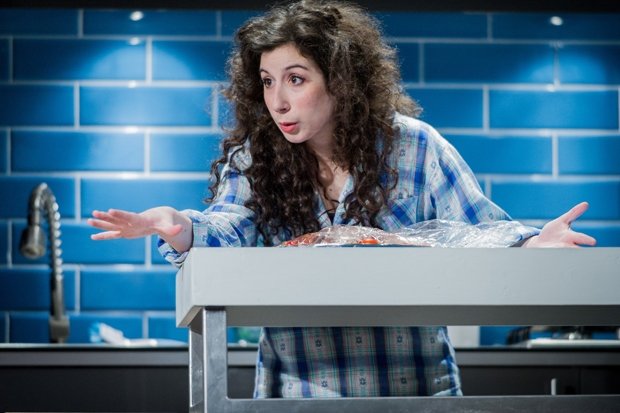Bad Jews has completed its long trek from a smallish out-of-town venue to a full-scale West End berth. Billed as a ‘hilarious’ family comedy it opens on a low-key note in a New York apartment where three cousins have gathered for grandpa’s funeral. Daphna is a puritanical vegan Jewess, training as a rabbi, who wants to move to Israel, marry a soldier and serve in the IDF. She’s insanely jealous of Jonah and Shlomo, whose parents have bought them a flat before either has found a job. Shlomo (who calls himself Liam) is a ‘bad Jew’ obsessed with Japanese culture who intends to marry out. He shows up at midnight having missed the funeral because he was in Aspen, ski-ing (a conspicuously unJewish activity), with his blonde girlfriend Melody who has lovely curves, German grandparents and virtually no brainpower. Daphna instantly launches an all-out assault, disguised as friendly curiosity, and accuses Melody of carrying the genes of murdering Teutons who slew native Americans in untold numbers. Stunned, Melody simpers back, ‘I don’t want to have an argument.’
This exchange might seem weird and nasty but it feels hilarious because the characters are single-mindedly following the path determined by their natures. Daphna then rounds on Shlomo and their feud evolves into a bitter debate about destiny and identity. She calls him a Semitic opportunist who confesses his ethnicity only when he wants to disparage fellow Jews. Shlomo accuses her of being an embittered sex-starveling whose ‘Israeli boyfriend’ is probably make-believe. The crux of the argument is a ‘chai’ or lucky medallion, which their grandpa hid in his mouth during years in a concentration camp. Daphna and Shlomo both claim ownership but Shlomo has the heirloom in his pocket and when he offers it to Melody, as a marriage garland, Daphna screams at him to get it off her ‘Christian cunt neck.’
The rhetoric seems at times so savage and toxic as to undermine its credibility but writer Joshua Harmon skilfully varies the emotional mood and finishes each hate-filled passage with a moment of tenderness that unites the characters in a brief interlude of goodwill.









Comments
Join the debate for just £1 a month
Be part of the conversation with other Spectator readers by getting your first three months for £3.
UNLOCK ACCESS Just £1 a monthAlready a subscriber? Log in